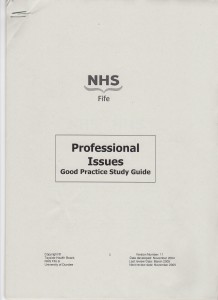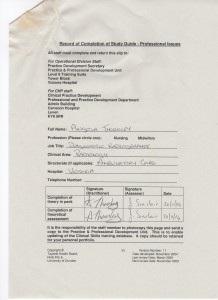Professional Issues
Sunday, November 23rd, 2014Answers to Activity Pack.
Activity 1.
Due to being a diagnostic radiographer the above scenario does not apply to me. However having been in a situation where a patient did not want an x-ray even though the doctor requested one, I did not perform the examination. I feel that it is up to the individual patient. If someone expressly states they didn’t want to go ahead with what I have been asked to perform then it is up to the doctor to explain why the exam is needed and not for me to force the exam.
Activity 2
1: Systems in place to ensure my competencies are: mandatory training, CPD, eKSF, lectures reflective learning and on-line training.
2: The aspects of my code of conduct that I can apply to carrying out my role as a radiographer are, keep up to date with best practice and maintain my personal CPD portfolio. Maintain confidentiality, while complying with the Data Protection Act and update and record all necessary records. Follow infection control policies.
Acivity 3
1: I am accountably to my line manager for the development and maintenance of my clinical skills.
2: The code of conduct addresses accountability issues addressing patient care as being priority. Ensuring the practitioner complies to the Codes and Standards that regulate the professions making it clear that each practitioner is personally accountable for their actions and omissions when dealing with patients, carers and other members of the team.
As a practitioner I am accountable for my individual responsibility and awareness of your own competence and educational needs. This also applies to issues such as delegation and the skill mix of staff to ensure that staff are prepared and supported to deliver the necessary care service. As well as complying to the wider organisational issues such as having the appropriate policies, procedures, reporting and governance arrangements in place that include miscommunication or faults.
Acitvity 4
I would prevent skill fade by keeping reasonably up to date with major changes and developments with the use of electronic libraries, internet and by attending lectures. Comply with National Institute for Clinical Excellence (NICE) and Clinical Governance. Comply with Ionising Radiation (Medical Exposure) Regulations 2000 (IRMER) along with The Ionising Radiations Regulations 1999. Continue to follow lifelong learning, reflective practice, evidence based care, CPD and e-KSF.
Activity 5
Clinical Governance influences my skills and practices by providing clear guidelines of responsibility and accountability. Protocols are implemented with guidelines for skill mix. Guidance due to evidence based practice is supported and applied routinely from everyday practice, with risk assessment being done before new roles and working practices are implemented. Service failures are monitored to analyse and improve services.
Activity 6
Does not apply in my profession. As a radiographer I would never have to make the clinical decision for blood transfusion.
Activity 7
Documentation difficulties in my clinical area are can be due to bad hand writing on a request card and this being interpreted wrongly and the wrong examination being performed. Another potential problem is someone mistakenly filling out the wrong examination or wrong body part on a request card.
Activity 8
Abbreviations are not permitted on the examination part of an x-ray request card. Any abbreviations on a card are discussed with the referrer who has requested the exam to get clear clarification on the meaning of the abbreviation being used.
Activity 9
N/A
Activity 10
As a health professional I am expected to keep reasonable up to date with evidence based practice and care and carrying out my duties following all the current protocols and procedures.
In the case of Hunter v Hanley the doctor was found to be negligent due to not carrying out a procedure not using the appropriate equipment. This case highlighted the need for a test for the standard of care which doctors and health professionals to adhere to. The Bolam case law stated a doctor is not negligent, if he is acting in accordance with a practice accepted as proper by a responsible body of medical men skilled in that particular art, merely because there is a body of such opinion that takes a contrary view”.
These two case highlight the need for clinical governance, so professionals are expected to continually update their skills and work in accordance to best practice.
Activity 11
N/A
Ethical issues to consider are the benefits to the patient and the valuable help and treatment that may be delayed if a venous blood sample was not provided.
Follow the principles inherent within the code of conduct set out by the Society and College of Radiographers (SCoR) to give advice and guidance to radiographers.
This code of conduct is adjunct to the current Health Professions Council (HPC) Standards of Conduct, Performance and Ethics1 and must be used in conjunction with it and all other relevant HPC publications.
The standards of ethical behaviour which underpin and sustain professional and personal conduct:
- Scope of Professional Practice
- Relationships with Service Users
- Relationships with Professional Staff
- Personal and Professional Standards
Keep up to date with best practice and maintain my personal CPD portfolio.
Maintain confidentiality, while complying with the Data Protection Act and update and record all necessary records. Follow infection control policies.
Responsibilty – meet all the standards of proficiency
Maintain my knowledge, skills and experience to practise lawfully, safely and effectively.
- practise safely and effectively within their scope of practice
- practise within the legal and ethical boundaries of their profession
- practise within the legal and ethical boundaries of their profession
- be able to practise as an autonomous professional, exercising their own professional judgement
- be aware of the impact of culture, equality, and diversity on practice
- be able to practise in a non-discriminatory manner
- understand the importance of and be able to maintain confidentiality
- be able to communicate effectively
- be able to work appropriately with others
- be able to maintain records appropriately
- be able to reflect on and review practice
- be able to assure the quality of their practice

